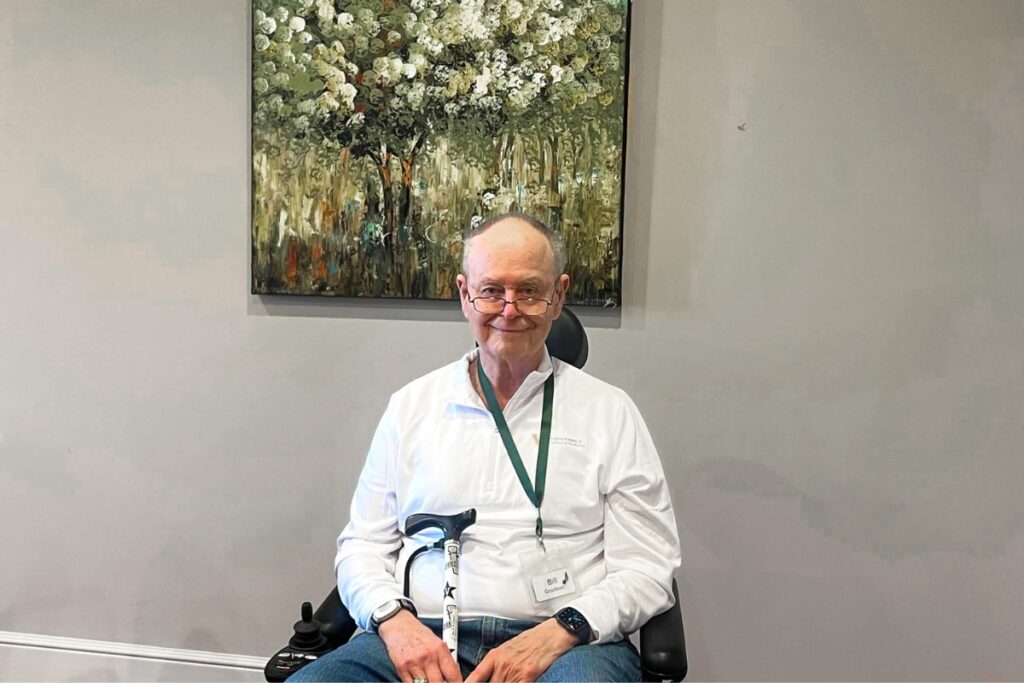
A retired Huntsville psychiatrist is still making a difference in community mental health, long after hanging up his hat.
Dr. Bill Goodson, the first director of what was originally the Huntsville-Madison County Mental Health Center, is still supporting the nonprofit, not as a practicing physician, but as a donor and advocate.
“I’m so happy to see what WellStone is doing,” Dr. Goodson shared. “You’re all doing such a good job.”
Goodson, a Huntsville native, spent decades supporting the organization’s mission. Recent developments at WellStone reignited his passion and engagement.
His story of service began in 1953. After graduating from Huntsville High School, Goodson went to Vanderbilt University to study medicine. Then followed his psychiatric residency in Boston with his wife, Elise, and their three children.
He was serving two years in the Army’s 82nd Airborne Division in North Carolina when he learned that his booming hometown had only one psychiatrist, Dr. Himon Miller. The family returned to the Rocket City, where Goodson began practicing psychiatry. Not surprisingly, Dr. Miller already had a month’s worth of patients lined up for him.
Dr. Goodson stayed busy and remained passionate about his work in private practice. But in 1969, a new opportunity emerged, and he seized it, becoming the first medical director to lead the newly formed Mental Health Center.
“This was a once-in-a-lifetime opportunity to do something for my hometown. This wonderful city,” explained Goodson. This wasn’t just an administrative, clinical, or medical position. He also had to fundraise, adding, “I was writing grants left and right. It was all-consuming. But it was worth it. “
Worth it because he and his small team, which included clinical psychologists Dr. Roger Rinn and Dr. Jack Turner, were making a difference. Ralph Ford, John Hays, and other Board members also played important roles in getting the Mental Health Center off the ground.
“We started a day treatment program for kids,” said Rinn. “Dr. Goodson was dedicated to the center and its purpose of making sure everyone who needed mental health services received them.”
“We did some really important work,” Goodson added. “One of the priorities was keeping care close to home and to stop the flow of people to the state hospitals. We had a great relationship with Huntsville Hospital and were very proud of that. We broke down barriers.”
Later in his career, Goodson also went out into Huntsville’s homeless camps. That’s something WellStone, along with several nonprofit partners, still does today.
“I saw desperate people who had been abandoned by everyone,” Goodson recalled. “I loved those guys and gals. There weren’t many happy endings, but there were some. You just keep going.”
And WellStone keeps going, too.
“It’s taken a long time,” said WellStone CEO Jeremy Blair. “Mental healthcare has, historically, had substantial barriers, but we are knocking them down with quality programs that are accessible and affordable. Goodson and his immediate successors, like Dr. Joann Moorman and Dr. Gary Porier, were true trailblazers in mental health care for our community. We owe them a great deal of gratitude.”
Dr. Goodson is also grateful, particularly for WellStone’s expansions in crisis care. WellStone Emergency Services (WES) opened in October 2022, becoming one of the state’s first 24/7 standalone crisis care centers. When CEO Jeremy Blair announced the pediatric addition, which is nearing completion, Goodson was moved to support the project charitably.
“I’m just so happy that we’re finally getting the full complement of services,” he said. “That was the original intent. Your team is completing what we set out to do. We can take good care of our folks, especially our children, without having to send them far away.”
Goodson, who left his full-time position at the Mental Health Center in 1980 and retired from private practice in 2010, has seen the field evolve dramatically over his career. When he started, electroshock was still commonly used for depression; insurance wouldn’t cover mental health care; and mental illness was hugely misunderstood.
“People got it mixed up with religion,” Goodson recalled, saddened by the heartbreaking stigma his patients often faced. “They figured it must be the devil and everyone just had to pray a good bit more.”
Fortunately, stigma, while persistent, has diminished greatly. Goodson, 87, is satisfied knowing thousands of patients are benefiting from the organization he helped get off the ground.
“I’ve been in practice since 1972,” said Rinn. “Dr. Goodson is the best psychiatrist I’ve ever worked with. He’s my hero.”
A hero who played a substantial role in WellStone’s past, and, now as a thoughtful donor, is playing a meaningful part in WellStone’s future.
